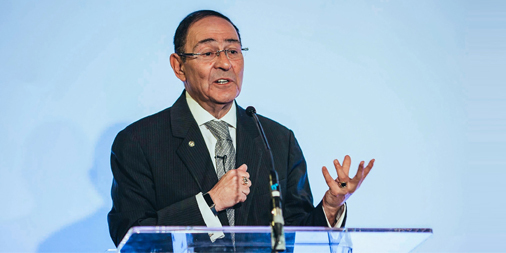
Sir Howard Bernstein spent his entire career in public service, but he was one of the most brilliant entrepreneurs in Britain. His success in transforming the life, prospects and renown of Greater Manchester came from a questing mind – always looking for new ways to make a breakthrough – combined with a relentless tenacity.
Howard had eyes everywhere. When I was business secretary I would often meet in London visiting delegations of overseas companies looking to invest in Britain. Somehow, Howard would get wind of it, leap on a train to London and insert himself into the delegations' schedules. Before long they would be lured into extending their visit to go to Manchester where he would personally show them around a tantalising array of development sites and indicate that enthusiatic local assistance was theirs for the asking. No wonder, after Howard's intervention, the Manchester skyline today is as synonymous with construction cranes as it was with factory chimneys in the industrial revolution.
Working with Howard throughout nearly a decade as a government minister was an education, and perhaps even an apprenticeship. When I was appointed Minister for Cities in 2011, I wanted to try a notion I called ‘City Deals' – in which the Government would reach an agreement with city leaders to do things differently in their area. The trouble was that the proposals from most cities were – after years of centralisation – too timid.
A visit to Manchester town hall to meet Richard Leese and Howard changed all that. The Greater Manchester City Deal, agreed in March 2012, was revolutionary. It included something we called an ‘earnback' – never before agreed by the Treasury for local government. This recognised the shared interest between the nation and the city in local growth. If, as a result of joint investment in transport infrastructure, the prosperity of the city grew, Greater Manchester should benefit from that as well as the Exchequer. So £30m a year for 30 years could flow to Greater Manchester if additional growth could be demonstrated to have resulted.
It was a brilliant proposal from Howard, facilitated by the outstanding Treasury second permanent secretary John Kingman. Its success convinced George Osborne of the case for devolution to be a major priority. This resulted in his 2014 Northern Powerhouse speech and the next devolution deal which created the Mayoralty of Greater Manchester, that Andy Burnham has made a position of national weight.
The 10th anniversary of that seminal, Bernstein-inspired Northern Powerhouse speech was the week of Howard's death.
The devolution which is now spreading across the country – half the population of England have an elected Mayor, whereas London was the only big city with one in 2010 – would not have happened without Howard Bernstein
Howard's success reflected his own – and Greater Manchester's – long established gift for partnership and an outlook of pragmatism. He served, and formed, a formidable team with two transformational leaders of Manchester City Council – Graham Stringer and Leese. The Greater Manchester model relied on effective and respectful working relationships across all 10 local councils – at times led by three different political parties. But this went way beyond local government.
Howard told Ed Balls' Harvard/Kings College interview project ‘my whole approach has been about place leadership. Not organisational leadership – that's different'. That meant he saw his role as working as closely with the cultural, university, sporting and business communities and leaders in the city as with the council administration. After all, that's what makes a city.
The devolution which is now spreading across the country – half the population of England have an elected Mayor, whereas London was the only big city with one in 2010 – would not have happened without Howard Bernstein. From gain share, to devolved responsibilities, to the combined authority model – they all emulate Greater Manchester in whole or part. And the palpable sense of vigour and excitement in Howard's beloved city today proves that public service really can make an enormous difference to people's lives and prospects.
The last time I worked with Howard was an unexpected postscript for both of us. In the hot summer of 2022 he had retired from Manchester City Council and I found myself – unexpectedly – back as secretary of state at the Communities Department for a limited 10-week run after Boris Johnson had resigned. Liverpool City Council was in difficulties. I went to see Steve Rotheram – the Liverpool City Region metro mayor – to ask him to lean in to lend leadership to the city authority and to find a positive route out of its troubles. Steve wisely wanted some experienced hands to help. So I rang up Howard and asked him if he (and Judith Blake of Leeds) would step in to help Liverpool. It was a tough task, but to my gratitude they both said yes.
And so the Liverpool Strategic Futures Panel came into being and has found a strong way forward for Liverpool making use of that city's strengths.
In his foreword to the panel's final report, Steve Rotheram thanks Howard for his guidance to this rival city and calls him ‘a titan of local government'. He was every bit of that, and a wonderful, and irreplaceable, man.
Manchester, and the nation, are so lucky to have had him.
Greg Clark is a Conservative former levelling up secretary
X – @GregClarkMP


